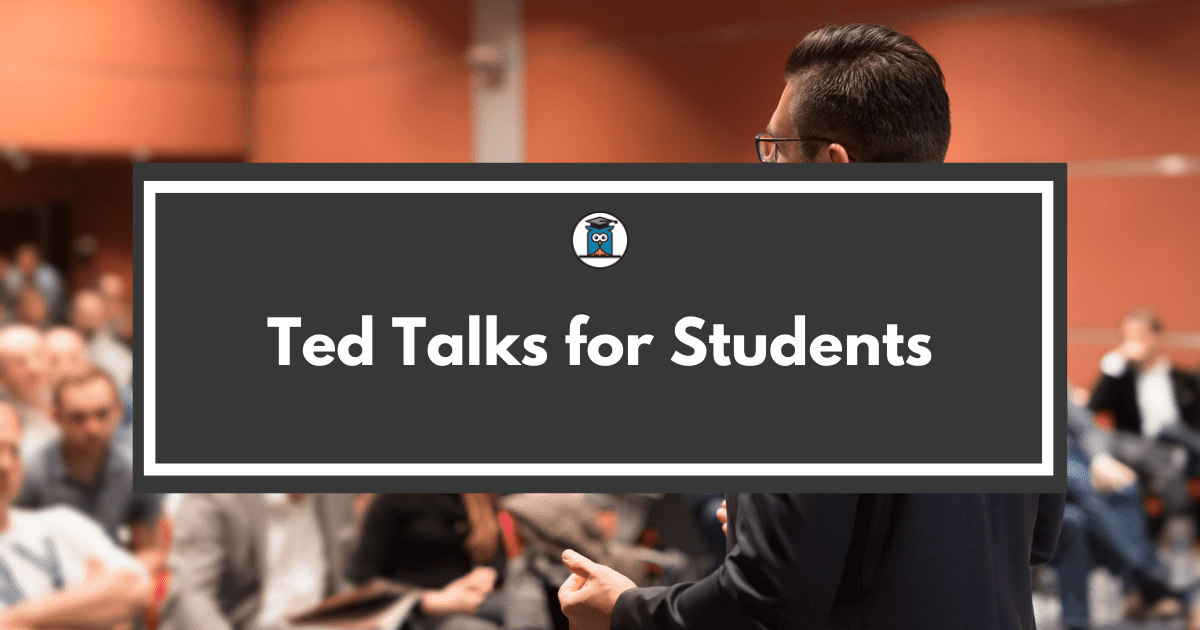For all you students who feel like you’re in a rut, or simply bored of homework, Ted Talks are great educational resources. These videos can help you find some inspiration, insight, or just new knowledge. Or at the very least, they’ll provide you with some entertainment. Plus, if you’re working remotely, you can use a Ted Talk to take a quick work break.
But with all that’s out there, it can be difficult to know where to start.
Below, I’ve rounded up some great Ted Talks for students. Hopefully they’ll spark your interest, conversations, ideas, and creativity.
1. The best kindergarten you’ve ever seen, Tekaharu Tezuka
Japanese architect Tekaharu Tezuka describes a kindergarten built on the premise that kindergarteners should not have any boundaries—at least, in terms of a building’s physical structure. Tekaharu explains how he constructed this kindergarten tailored to adolescent development. For instance, there are no barriers between classrooms, or between indoors and outdoors. This means there are “no acoustic barriers”. Unlike in a traditional classroom where there are doors between the outside and inside, in this kindergarten, everything is connected.
“I think architecture is capable of changing this world, and people’s lives. And this is one of the attempts to change the lives of children.” – Tekaharu Tezuka
Tekaharu proposes that when you make boundaries and close children off from the natural outdoor noise, they may get nervous and hide. Instead of hiding, in this kindergarten, the children leave and then come back. The school is full of trees and skylight, which, according to Tezuka, allows children to develop naturally, rather than in a forced manner.
2. Inside the mind of a master procrastinator, Tim Urban
Tim Urban focuses on how procrastination has affected his life, discussing what happens in the brain during procrastination. He highlights the way in which a procrastinator brain may be different from a non-procrastinator brain. But ultimately, Urban proposes that we all—from time to time—procrastinate.
Urban uses metaphors to describe how a procrastinator thinks. He introduces the “rational decision-maker”, the “instant gratification monkey”, and the “panic monster”, who are the key players during procrastination.
“The Instant Gratification Monkey does not seem like a guy you want behind the wheel. He lives entirely in the present moment. He has no memory of the past, no knowledge of the future, and he only cares about two things: easy and fun.” – Tim Urban
This Ted Talk is incredibly relatable for anyone who is a regular procrastinator. By touching on the consequences of long-term procrastination, Urban encourages us to really look at what we’re procrastinating, and how it’s impacting our lives.
3. How To Stay Calm When You Know You’ll Be Stressed, Daniel Levitin
Cognitive psychologist and neuroscientist Daniel Levitin discusses how we can be more prepared for stressful situations. He highlights what happens to the brain under stress.
When in stressful situations, the brain releases cortisol, which increases your heart rate, heightens adrenaline levels, and obscures your thinking. Ultimately, though, his point is that we’ll all experience situations where we have to make important, potentially life-changing decisions. And in these scenarios, if you’re stressed, you may not think clearly.
“Unfortunately, one of the things that goes out the window during those times of stress is rational, logical thinking, as Danny Kahneman and his colleagues have shown. So we need to train ourselves to think ahead to these kinds of situations.” – Daniel Levitin
Levitin describes the concept, “the pre-mortem”, which is a management system where you look at potential problems or situations which could arise, and then try to figure out all you can do to prevent these problems or minimize damage they’d cause.
In his Ted Talk, Daniel Levitin reassures the audience that no one’s perfect. We’re all flawed and will fail every now and then. But if we think ahead, we can put systems into place to ensure we’re doing all we can to minimize damage. Furthermore, this stems from recognizing that in a stressful situation, we may not be capable of thinking to the best of our ability.
4. To This Day … for the bullied and beautiful, Shane Koyczan
Shane Koyczan uses spoken word and poetry to beautifully express what it’s like to grow up feeling completely different from everyone else. And, what it’s like to experience bullying. Shane implements music and video animation to connect his audience around these themes.
“Standing up for yourself doesn’t have to mean embracing violence.” – Shane Koyczan
This Ted Talk creatively illustrates the debilitating challenges Shane has faced around his mental health. Koyczan touches on misunderstood components of depression, such as the way in which individuals often “become” their mental disability through labels and dehumanization.
5. How boredom can lead to your most brilliant ideas, Manoush Zomorodi
I think each and every one of us can relate to indulging in excessive or habitual behaviors. And for many of us, it’s social media. In her Ted Talk, Manoush Zomorodi discusses her journey with investigating boredom, technology, and creativity.
“If you have never known life without connectivity, you may never have experienced boredom. And there could be consequences.” – Manoush Zamorodi
Zomorodi explains that when you get bored, your body goes into this autopilot, default mode. At the moment, you may think what you’re doing is mundane—grocery shopping, going to the bank, doing your laundry, etc. But in reality, it’s during this time that your brain actually goes to town. When you’re seemingly doing nothing, you’re actually making important connections, solving some of your most harrowing problems, and engaging in what’s called autobiographical planning.
Autobiographical planning is when you look back on your life, pinpoint the big moments, create a personal narrative, and then craft goals and think about necessary steps toward them. Zomorodi highlights the major ways in which technology and social media have grown so powerful that we often don’t engage in autobiographical planning. We so frequently multitask, which, based on scientific evidence, is neither effective nor productive. Zomordi urges us to entertain the idea of reclaiming the “cracks” in our day to “jumpstart creativity”.
6. Grit: the power of passion and perseverance, Angela Lee Duckworth
From being a seventh grade teacher for years to earning a psychology degree, Angela Lee Duckworth has some critical insight on students and their ability to learn. Duckworth describes her experience as a teacher, noting that she continually observed that IQ was not the only difference between her best and worst students. She realized that the easiest way to measure student ability is through IQ, but that doing well in both school and life depends on more than just this number.
Angela studied kids and adults, repeatedly focusing on the question, who is successful, and why? After studying individuals in several different contexts, her team came to pinpoint one characteristic that’s a significant success predictor: grit. She points out, “talent doesn’t make you gritty,” and notes that grit is unrelated to, or even inversely related to talent.
“Grit is living life like it’s a marathon, not a sprint.” – Angela Lee Duckworth
Angela Lee Duckworth leaves the audience with one suggestion for helping children develop grit. She introduces the growth-mindset, which is an idea developed at Stanford University, by Psychologist Carol Dweck. The growth-mindset proposes that learning ability isn’t fixed—it is changeable with effort. Dweck found that when kids read about the brain and its growth, they’re more likely to persevere when they fail because they understand that failure isn’t a permanent condition.
7. Dare to disagree, Margaret Heffernan
Through delving into examples in research and business, Margaret Heffernan opens her Ted Talk with a conversation about conflict, and the importance of rising to it instead of running from it. Heffernan describes how Alice Stewart, an epidemiologist, came across an important discovery. Alice wanted to understand what was causing childhood cancer. She discovered that the determinant was whether or not the child’s mother had been x-rayed during their pregnancy.
This discovery went against previous knowledge, and Heffernan describes how a major contribution to Alice’s success was the relationship she had with her statistician, George Kneale. George aimed to prove Stewart wrong, since doing so was the only way Alice could know whether she was correct. The two used a collaboration model that essentially views conflict as thinking.
“It’s a fantastic model of collaboration — thinking partners who aren’t echo chambers. I wonder how many of us have, or dare to have, such collaborators. “ – Margaret Heffernan
Heffernan highlights constructive conflict, which, evidently, is the most effective way to think. She notes that some of the biggest problems arise not from individuals, but from organizations. And these organizations are unable to think and grow, because the people within are too afraid of conflict. Heffernan draws on a statistic that highlights this issue: among US and European executives, 85% acknowledged have concerns at work which they are afraid to bring up.
If we can see conflict as thinking, we can debate, be creative, and ultimately solve the conflict. To do this, Heffernan notes, it’s important to actively seek people who have different views, knowledge, and experience than us. And this takes energy and patience, since our neurological inclination is to seek people who are similar to us. But it’s worth it for the results.
At My Private Professor, we embrace the chance to provide students with as many academic resources as possible. Hopefully these Ted Talks leave you with questions, curiosity, and inspiration—and maybe even spur you to come up with a Ted Talk idea of your own!
Author: Lydia Schapiro







